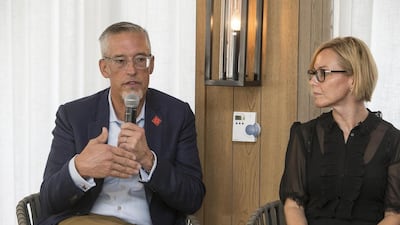Global warming, digital disruption, Brexit, Trump … the only thing we can be sure of these days is that it’s a Vuca (volatile, uncertain, complex and ambiguous) world out there. So amid such uncertainty, how should brands position themselves to endure?
Howard Belk, co-chief executive and chief creative officer at global branding consultants Siegel+Gale, who recently visited Dubai from his New York base to discuss the future of branding with a panel of UAE-based experts, says to navigate through the Vuca complexities transparency is key.
“Young people nowadays see through nonsense, so I think in this increasingly digital world, transparency will become more and more the norm for brands,” says Mr Belk. “There’s going to be a divide between fixed, established iconic brands and very ephemeral brands. There will be a lot of washouts, a lot of emerging brands who will last five years and then another set of fixed brands will rise who will have to continually refresh themselves. We’ll see Uber-like disruption, which they’ll have to respond to and get ahead of.”
The UAE telecoms operator du is one company that’s been busy rebranding itself of late. Mark Briers, senior vice president of customer experience at du, says over the past two years the company has engaged in a pricing battle with its competitor Etisalat. “Clearly if we carry on competing on price, it’s not going to be sustainable,” he says. “From a strategic perspective, we need to find a different position in the market.”
Mr Belk says those looking to rebrand should start with their end goal in mind. “How do you want our customers to feel after they’ve engaged in your product or experience? If you work backwards, it can clarify where you put your energy and resources,” he says. “To ascertain what things will make people feel that way requires a fact base – what really drives opinion, desire and satisfaction? Companies need to map that with the realities of their business model.”
To achieve its goal of improving customer experience, du mapped out the seven moments of its customers’ journey and defined a set of rules for what should happen for the customer at each moment along the way.
“This is how we can have consistent expression of our brand,” says Mr Briers. “We’ve also worked with our brand team to develop brand values and used those to create a brand promise.”
According to Mr Belk, one of the biggest branding challenges today is that to really drive business results, the whole organisation has to get behind the rebrand – not just marketing but sales and human resources too.
“There are technology, contractual and logistical requirements that really need to get aligned with those business objectives, because a rebranding is not an ad campaign,” he explains. “To win the support and engagement of those teams, your fact base becomes very important, because a lot of those employees in other departments are left-brained people who respond to facts and data.”
Mr Briers says du’s new “customer promise” has become the direction for all of its employees to follow. “We’re using it for internal alignment, to put resources behind it, which also gives people a common ambition – how should I behave in the office, what are my responsibilities, how do I make things simple, not only for the customer but for colleagues who depend on me.”
For Zeina Sleiman, associate director of institutional relations and alumni affairs at the graduate business school Insead, the secret to maintaining a positive brand image in a rapidly changing world lies with the organisation’s brand ambassadors – their alumni. “We have 47 alumni associations around the world,” she explains. “They follow the brand guidelines and become our global ambassadors. When they share their story, they share the emotional experience of how Insead changed their lives.”
When it comes to budget constraints during uncertainty and how that can affect a company’s ability to deliver quality brand experiences. Philip Davies, the Emea president at Siegel+Gale and a panel moderator, cites the example of Winston Churchill. “During WW2 when the budget was being cut, Churchill said ‘we have no money, we must think.’ Sometimes it’s about just applying great brain power and making sure you’ve got absolutely the right plan going forward to make sure you overcome monetary hurdles.”
Anca Westley, head of marketing for Masdar, says her eco-friendly government organisation has overcome budgeting hurdles by engaging frequently with its thought leaders. “We ran one of our most successful campaigns by asking our global partners ‘where do you think the industry will be in 10 years’ time? Do you think Masdar will play a role?’ You need to have that relationship in the first place, but it costs us absolutely nothing to ask. We just recorded it on Skype, and because of their followers on social media, the reach was fantastic.”
Despite the global uncertainty, Mr Belk says it’s an interesting time to be in the brand-building world. “I see a lot of marketing-type organisations moving away from it and saying ‘we need to be a different kind of company’,” he says. “But I think brands are going to matter as much as they ever have, if not more, certainly for the next five years or more.”
business@thenational.ae
Follow The National's Business section on Twitter

